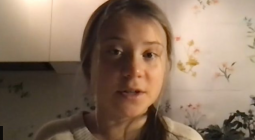Greta Thunberg on the climate delusion: ‘We’ve been greenwashed out of our senses. It’s time to stand our ground’
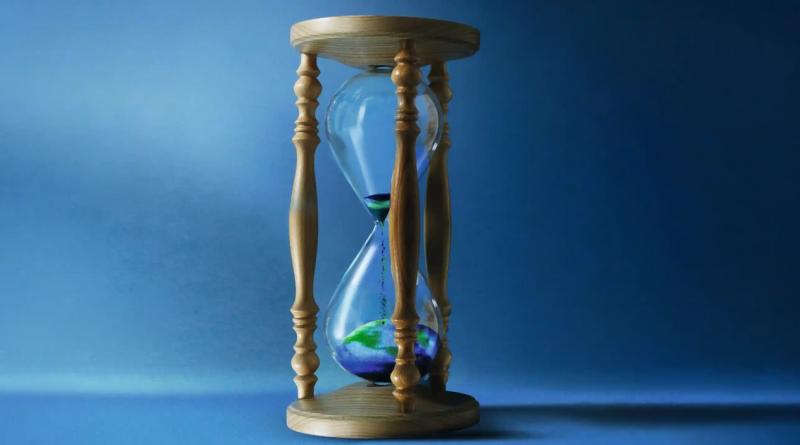
Governments may say they’re doing all they can to halt the climate crisis. Don’t fall for it – then we might still have time to turn things around
Maybe it is the name that is the problem. Climate change. It doesn’t sound that bad. The word “change” resonates quite pleasantly in our restless world. No matter how fortunate we are, there is always room for the appealing possibility of improvement. Then there is the “climate” part. Again, it does not sound so bad. If you live in many of the high-emitting nations of the global north, the idea of a “changing climate” could well be interpreted as the very opposite of scary and dangerous. A changing world. A warming planet. What’s not to like?
Perhaps that is partly why so many people still think of climate change as a slow, linear and even rather harmless process. But the climate is not just changing. It is destabilising. It is breaking down. The delicately balanced natural patterns and cycles that are a vital part of the systems that sustain life on Earth are being disrupted, and the consequences could be catastrophic. Because there are negative tipping points, points of no return. And we do not know exactly when we might cross them. What we do know, however, is that they are getting awfully close, even the really big ones. Transformation often starts slowly, but then it begins to accelerate.
The German oceanographer and climatologist Stefan Rahmstorf writes: “We have enough ice on Earth to raise sea levels by 65 metres – about the height of a 20-storey building – and, at the end of the last ice age, sea levels rose by 120 metres as a result of about 5C of warming.” Taken together, these figures give us a perspective on the powers we are dealing with. Sea-level rise will not remain a question of centimetres for very long.
The Greenland ice sheet is melting, as are the “doomsday glaciers” of west Antarctica. Recent reports have stated that the tipping points for these two events have already been passed. Other reports say they are imminent. That means we might already have inflicted so much built-in warming that the melting process can no longer be stopped, or that we are very close to that point. Either way, we must do everything in our power to stop the process because, once that invisible line has been crossed, there might be no going back. We can slow it down, but once the snowball has been set in motion it will just keep going.
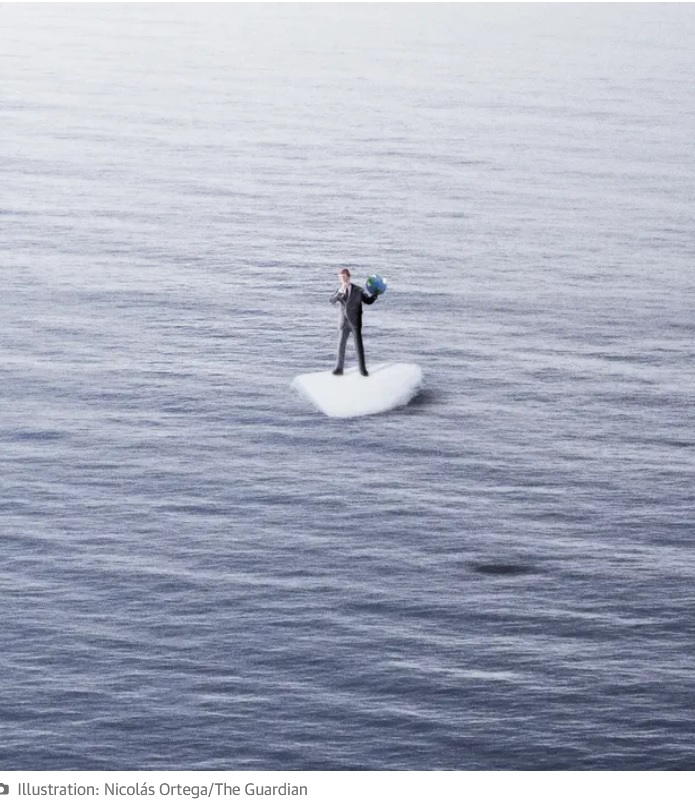
“This is the new normal” is a phrase we often hear when the rapid changes in our daily weather patterns – wildfires, hurricanes, heatwaves, floods, storms, droughts and so on – are being discussed. These weather events aren’t just increasing in frequency, they are becoming more and more extreme. The weather seems to be on steroids, and natural disasters increasingly appear less and less natural. But this is not the “new normal”. What we are seeing now is only the very beginning of a changing climate, caused by human emissions of greenhouse gases. Until now, Earth’s natural systems have been acting as a shock absorber, smoothing out the dramatic transformations that are taking place. But the planetary resilience that has been so vital to us will not last for ever, and the evidence seems to suggest more and more clearly that we are entering a new era of more dramatic change.
Climate change has become a crisis sooner than expected. So many of the researchers I’ve spoken to have said that they were shocked to witness how quickly it is escalating. But since science is very cautious when it comes to making predictions, maybe this should not come as a big surprise. One result of this, however, is that very few people actually knew how to react when the signs started becoming obvious in recent years. And fewer still had planned how to communicate what is happening. It seems like the vast majority of people were preparing for a different, less urgent scenario. A crisis that would take place many decades into the future. And yet here we are. The climate and ecological crisis is not happening in some faraway future. It’s happening right here and right now.
If everyone lived like we do in Sweden, we would need the resources of 4.2 planet Earths to sustain us. And the climate targets set in the Paris agreement would be but a very distant memory – a threshold that we would have crossed many, many years ago. The fact that 3 billion people use less energy, on an annual per capita basis, than a standard American refrigerator gives you an idea of how far away from global equity and climate justice we currently are.
The climate crisis is not something that “we” have created. The worldview that largely dominates the perspective from Stockholm, Berlin, London, Madrid, New York, Toronto, Los Angeles, Sydney or Auckland is not so prevalent in Mumbai, Ngerulmud, Manila, Nairobi, Lagos, Lima or Santiago. People from the parts of the world that are most responsible for this crisis must realise that other perspectives do exist and that they have to start listening to them. Because when it comes to the climate and ecological crisis – just like most other issues – many people living in rich economies still act as if they rule the world. By using up the remains of our carbon budgets – the maximum amount of CO2 we can collectively emit to give the world a 67% chance of staying below 1.5C of global temperature rise – the global north is stealing the future as well as the present. It is stealing not only from its own children but, above all, from those who live in the most affected parts of the world, many of whom are yet to build much of the most basic modern infrastructure that others take for granted. And still this deeply immoral theft does not even exist in the discourse of the so-called developed world.
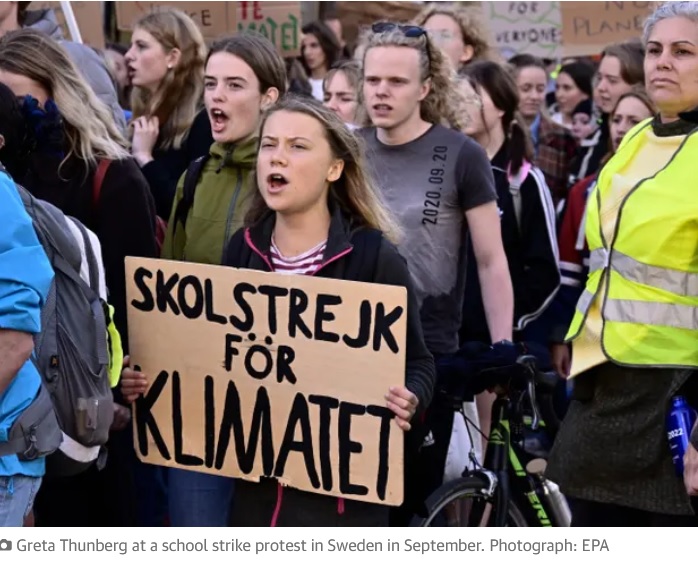
Saving the world is voluntary. You could certainly argue against that statement from a moral point of view, but the fact remains: there are no laws or restrictions in place that will force anyone to take the necessary steps towards safeguarding our future living conditions on planet Earth. This is troublesome from many perspectives, not least because – as much as I hate to admit it – Beyoncé was wrong. It is not girls who run the world. It is run by politicians, corporations and financial interests – mainly represented by white, privileged, middle-aged, straight cis men. And it turns out most of them are terribly ill suited for the job. This may not come as a big surprise. After all, the purpose of a company is not to save the world – it is to make a profit. Or, rather, it is to make as much profit as it possibly can in order to keep shareholders and market interests happy.
This leaves us with our political leaders. They do have great opportunities to improve things, but it turns out that saving the world is not their main priority, either.
Approaching the issues of the climate and ecological crisis inevitably involves confronting numerous uncomfortable questions. Taking on the role of being the one who tells the unpleasant truth, and thereby risking one’s popularity, is clearly not on any politician’s wishlist. So they try to stay clear of the subject until they absolutely cannot avoid it any longer – then they turn to communication tactics and PR to make it seem as if real action is being taken, when in fact the exact opposite is happening.
It gives me no pleasure whatsoever to keep calling out the bullshit of our so-called leaders. I want to believe that people are good. But there really seems to be no end to these cynical games. If your objective as a politician truly is to act on the climate crisis, then surely your first step would be to gather accurate figures for our actual emissions to get a complete overview of the problem, and from there start looking at real solutions? That would also give you a rough idea of the changes needed, the scale of them and how quickly they need to be put in place. This, however, has not been done – or even suggested – by any world leader. Or, to my knowledge, by any one single politician.
Journalist Alexandra Urisman Otto describes how she started investigating Swedish climate policies and found that only a third of our actual emissions of greenhouse gases were included in our climate targets and the official national statistics. The rest were either outsourced or hidden in the loopholes of international climate accounting frameworks. So whenever the climate crisis is debated in my “progressive” home country, we conveniently leave out two-thirds of the problem. An investigation by the Washington Post in November 2021 has shown that this phenomenon is far from unique to Sweden. Though the figures vary from case to case, this process and the overall mentality of constantly trying to sweep things under the carpet and blame others is the international norm.
So when our politicians say that we must solve the climate crisis, we should all ask them which climate crisis they are referring to. Is it the crisis that contains all our emissions or the one that contains only a part of them? When politicians go a step further and accuse the climate movement of not offering any solutions to our problems, we should ask them what problems they are talking about. Is it the problem that is caused by all our emissions or just by the ones they didn’t manage to outsource or hide in the statistics? Because these are completely different issues.
It will take many things for us to start facing this emergency – but, above all, it will take honesty, integrity and courage. The longer we wait to start taking the action needed to stay in line with our international targets, the harder and more costly it will get to reach them. The inaction of today and yesterday must be compensated for in the time that lies ahead.
For us to have even a small chance of avoiding setting off irreversible chain reactions far beyond human control, we need drastic, immediate, far-reaching emission cuts at the source. When your bathtub is about to overflow, you don’t go looking for buckets or start covering the floor with towels – you start by turning off the tap, as soon as you possibly can. Leaving the water running means ignoring or denying the problem, delaying doing anything to resolve it and downplaying its consequences.
Our politicians do not need to wait for anyone else in order to start taking action. Nor do they need conferences, treaties, international agreements or outside pressure. They could start right away. They also have – and have had for a long time – endless opportunities to speak up and send a clear message about the fact that we must fundamentally change our societies. And yet, with very few exceptions, they actively choose not to. This is a moral decision that will not only cost them dearly in the future, it will put the entire living planet at risk.
According to the United Nations’ emissions gap report, the world’s planned fossil fuel production by the year 2030 will be more than twice the amount that would be consistent with keeping to the 1.5c target. This is science’s way of telling us that we can no longer reach our targets without a system change, because meeting our targets would literally require tearing up contracts, valid deals and agreements on an unimaginable scale. This should, of course, be dominating every hour of our everyday news feed, every political discussion, every business meeting and every inch of our daily lives. But that is not what is happening.
The media and our political leaders have the opportunity to take drastic and immediate action, and still they choose not to. Perhaps it is because they are still in denial. Maybe it is because they do not care. Maybe it is because they are unaware. Maybe it is because they are more scared of the solutions than of the problem itself. Maybe it is because they are afraid of causing social unrest. Maybe they are afraid of losing their popularity. Maybe they simply did not go into politics or journalism to uproot a system they believe in – a system they have spent their lives defending. Or maybe the reason for their inaction is a mixture of all these things.
We cannot live sustainably within today’s economic system. Yet that is what we are constantly being told we can do. We can buy sustainable cars, travel on sustainable motorways, powered by sustainable petroleum. We can eat sustainable meat and drink sustainable soft drinks out of sustainable plastic bottles. We can buy sustainable fast fashion and fly on sustainable aeroplanes using sustainable fuels. And, of course, we are going to meet our short- and long-term sustainable climate targets, too, without making the slightest effort.
“How?” you might ask. How can that be possible when we don’t yet have any technical solutions that can fix this crisis alone, and the option of stopping doing things is unacceptable from our current economic standpoint? What are we going to do? Well, the answer is the same as always: we will cheat. We will use all those loopholes and all the creative accounting that we have conjured up in our climate frameworks since the very first conference of the parties, the 1995 Cop1 in Berlin. We will outsource our emissions along with our factories, we will use baseline manipulation and start counting our emission reductions when it suits us best. We will burn trees, forests and biomass, as those have been excluded from the official statistics. We will lock decades of emissions into fossil gas infrastructure and call it green natural gas. And then we will offset the rest with vague afforestation projects – trees that might be lost to disease or fire – while we simultaneously cut down the last of our old-growth forests at a much higher speed.
Don’t get me wrong. Planting the right trees in the right soil is a great thing to do. It eventually sequesters carbon dioxide from the atmosphere and we should do it wherever it is suitable for the soil and suitable for the people living there who care for that land. But afforestation should not be confused with offsetting or climate compensation, because that is something completely different. You see, the main problem is that we already have at least 40 years of carbon dioxide emissions to “compensate” for. It is all up there, in the atmosphere, and that is where it will stay, probably for many centuries to come. This historic CO2 is what we should be focusing on when we are using our present – very limited – ways of removing CO2 from the atmosphere, in various projects such as planting trees. But offsetting, as we have conceived it, is not meant to do that. It was never created for us to clean up our mess. Far too often it has been used as an excuse for us to continue emitting CO2, maintain business as usual and meanwhile send a signal that we have a solution and therefore we do not have to change.
Words matter, and they are being used against us. These are lies. Dangerous lies that will cause further, disastrous delay. Predictions by the UN conclude that our CO2 emissions are expected to rise by another 16% by 2030. The time we have left to avoid creating increasing climate catastrophes in many places around the world is rapidly running out.
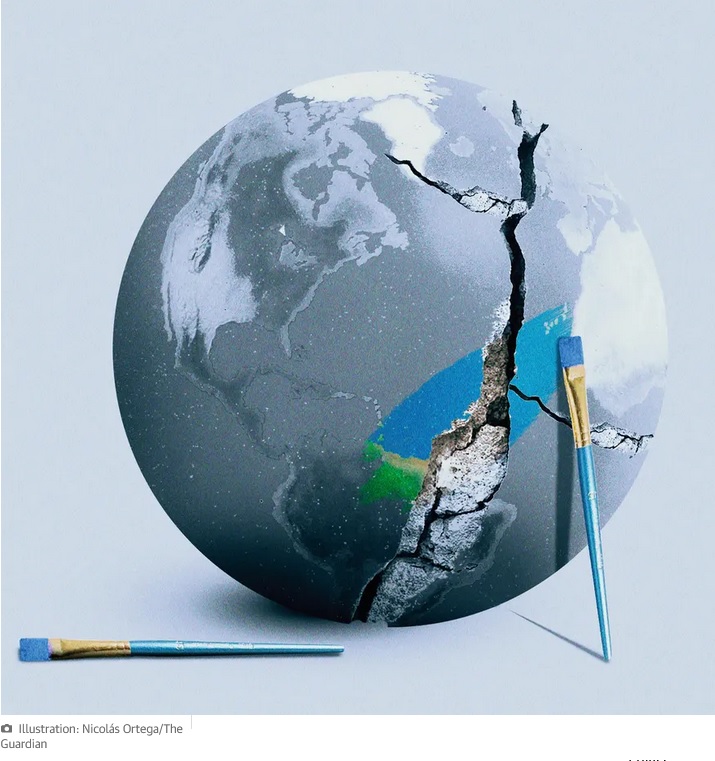
We are currently on track to have a world that is 3.2C hotter by the end of the century – and that’s if countries fulfil all the policies they have in place, policies that are often based on flawed and under-reported numbers. But in many cases they are nowhere near doing even that. We are “seemingly light years away from reaching our climate action targets”, to quote UN secretary general António Guterres in the autumn of 2021. And there is also the matter of our previous track record of failure when it comes to delivering on all those non-binding pledges and promises. Let’s just say it is not so impressive or convincing.
Even if we carried out all of our climate action plans, we’d still be in trouble. Net zero by 2050 is simply too little, too late. There is just too much at stake for us to place our destiny in the hands of undeveloped technologies. We need real zero. And we need honesty. At the very least, we need our leaders to start including all our actual emissions in our targets, statistics and policies. Before they do that, any mention of vague, future goals is nothing but a distracting waste of time. They say that we should not let the perfect be the enemy of the good. But what exactly do we do when the “good” not only fails to keep us safe but is also so far away from what is needed that it can only be described as comedy material. Very dark comedy, but still.
They say we must be able to compromise. As if the Paris agreement were not already the world’s biggest compromise. A compromise that has already locked in unimaginable amounts of suffering for the most affected people and areas. I say: “No more.” I say: “Stand your ground.” Our so-called leaders still think they can bargain with physics and negotiate with the laws of nature. They speak to flowers and forests in the language of US dollars and short-term economics. They hold up their quarterly income reports to impress the wild animals. They read stock-market analysis to the waves of the ocean, like fools.
We are approaching a precipice. And I would strongly suggest that those of us who have not yet been greenwashed out of our senses stand our ground. Do not let them drag us another inch closer to the edge. Not one inch. Right here, right now, is where we draw the line.
This is an edited extract from The Climate Book created by Greta Thunberg and published on 27 October by Allen Lane (£25). To support the Guardian and Observer, buy your copy from guardianbookshop.com. Delivery charges may apply
cover photo: Illustration: Nicolás Ortega/The Guardian


